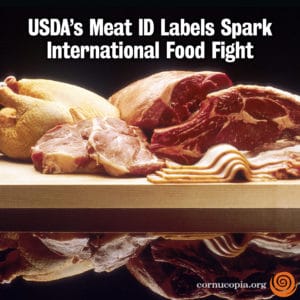Investors.com
By Ciaran McEvoy

Most Americans don’t know where their chicken, beef and pork were born, raised and slaughtered, but a new rule now requires that labeling. Supporters say it educates consumers. But critics, including major meat companies, say it’s a costly and unnecessary protectionist measure.
Cargill and Tyson Foods (TSN), as well as their allies among meatpacking and major ranching associations, are locking horns with the Consumer Federation of America, farmers and small-to-midsize ranchers’ groups over the country of origin label rule, known in shorthand as COOL.
The COOL rule, which went into effect Saturday, requires more specific meat labels. It also bars commingling meat for everything except ground beef, by requiring all meat in a package to come from the same source. That will require new infrastructure to segregate cattle, swine and poultry from different countries.
Farmers’ associations and some ranchers’ groups say the rule keeps shoppers informed, much like grass-fed and organic labels.
“The consumer knows best,” Jess Peterson, executive vice president of U.S. Cattlemen’s Association, said. “They ought to know where their cattle are coming from.”
Border Grill
But major meat processors — along with the Canadian and Mexican governments — are crying foul, arguing that COOL imposes additional unnecessary costs on retailers and meat importers while exempting processed meat such as bacon. They say consumers will have a prejudice against buying meat from outside the U.S. Imagine grilling made-in-Canada steaks on Memorial Day or the Fourth of July.
They have called on Congress, which is negotiating a new farm bill, to rewrite the U.S. Department of Agriculture rule.
Meat processors also worry that Canada and Mexico will retaliate with tariffs on U.S. meat.
“It suggests to me that the fundamental purpose of the law is not about informing consumers, but blocking trade,” said Mark Dopp, senior vice president of regulatory affairs with the American Meat Institute. “Why are we doing something that simply antagonizes our two most important trading partners? It makes no sense.”
Tyson last month stopped buying slaughter-ready cattle from Canada citing higher expenses due to country-of-origin labeling.
A consortium of food groups and companies, including Smithfield Foods (SFD), Kraft (KRFT) and Hormel (HRL), wrote an Oct. 29 letter to the chairs and ranking members of the House and Senate agriculture committees. The letter urged them “to develop a WTO-compliant solution to the COOL law … while protecting thousands of American jobs from the impact of retaliation.”
The USDA estimates the rule will cost meat processors and retailers $53 million and $192 million to implement, but the American Meat Institute expects the tally will be about $500 million.
The battle over country-of-origin labeling started in the mad cow disease crisis a decade ago.
Back To The WTO
COOL was part of a 2008 farm bill that Congress passed over President Bush’s veto. An initial 2009 rule led Canada and Mexico to take the U.S. before the World Trade Organization.
The WTO ruled last year that the USDA’s country-of-origin labels had a “detrimental impact on imported livestock because its record-keeping and verification requirements create an incentive for processors to use exclusively domestic livestock” and ordered it rewritten.
In May, the USDA issued a new rule, whose six-month grace period ended Saturday. But meatpackers north and south of the border said the revisions made it even worse. A federal judge denied their request to halt it. That decision is being appealed.
Canada and Mexico also took action again to the WTO, which is scheduled to hear COOL-related arguments in March.
Chandler Goule, vice president of government relations at Na tional Farmers Union, which backs COOL, noted that Canada and 36 other nations have their own country-of-origin labels. He also said the money spent by major meat companies to comply with the rule is a tiny fraction of the 50 billion pounds of beef and pork bought by Americans in 2011. “You’re talking a minimal increase here,” he said.

